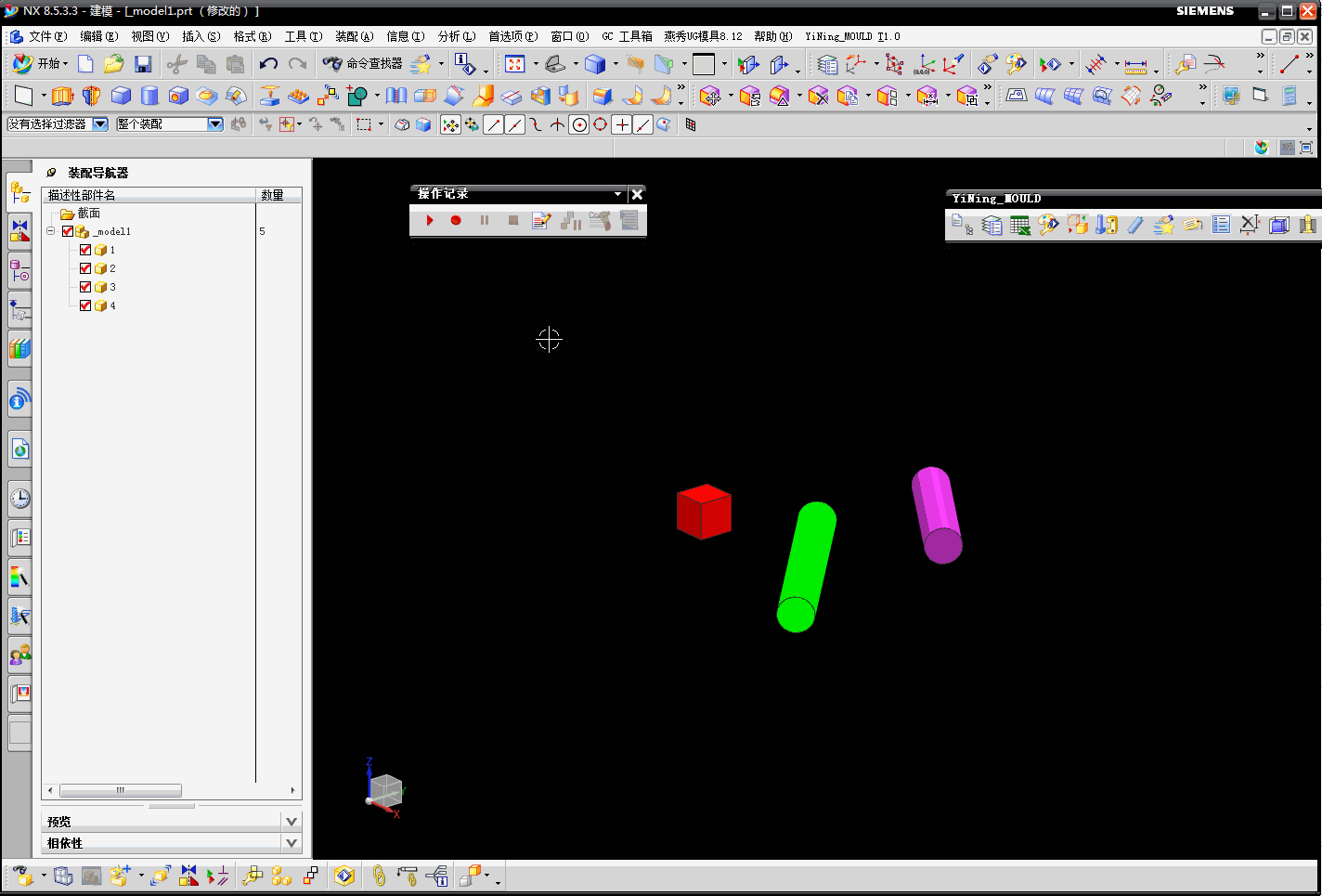C++
// Mandatory UF Includes
#include <uf.h>
#include <uf_object_types.h>
// Internal Includes
#include <NXOpen/ListingWindow.hxx>
#include <NXOpen/NXMessageBox.hxx>
#include <NXOpen/UI.hxx>
// Internal+External Includes
#include <NXOpen/Annotations.hxx>
#include <NXOpen/Assemblies_Component.hxx>
#include <NXOpen/Assemblies_ComponentAssembly.hxx>
#include <NXOpen/Body.hxx>
#include <NXOpen/BodyCollection.hxx>
#include <NXOpen/Face.hxx>
#include <NXOpen/Line.hxx>
#include <NXOpen/NXException.hxx>
#include <NXOpen/NXObject.hxx>
#include <NXOpen/Part.hxx>
#include <NXOpen/PartCollection.hxx>
#include <NXOpen/Session.hxx>
#include <NXOpen/BasePart.hxx>
#include <NXOpen/AttributeManager.hxx>
#include <NXOpen/AttributePropertiesBaseBuilder.hxx>
#include <NXOpen/AttributePropertiesBuilder.hxx>
#include <NXOpen/TaggedObject.hxx>
#include <NXOpen/NXObjectManager.hxx>
// Std C++ Includes
#include <iostream>
#include <sstream>
using namespace NXOpen;
using namespace std;
void MyClass::do_it()
{
// TODO: add your code here
//用户代码
Session *theSession = Session::GetSession();//获取绘画客口
Part *workPart(theSession->Parts()->Work());//获取工作部件
Part *displayPart(theSession->Parts()->Display());//获取显示部件
//BasePart *baseworkpart = theSession->Parts()->BaseWork();//定义baseworkpart
BasePart *basedisplaypart = theSession->Parts()->BaseDisplay();//定义basedisplaypart
//遍历
Assemblies::ComponentAssembly *componentassembly = basedisplaypart->ComponentAssembly();//获取装配底层(BaseWork为当前工作装配,basedisplaypart为当前显示的装配 两种结果是不一样的)
Assemblies::Component *rootcomponent = componentassembly->RootComponent();//获取rootcomponent
if (rootcomponent==NULL)//判断rootcomponent是否为空,空即提示不是装配,是就执行遍历
{
//弹出消息框(四种消息框 错误:DialogTypeError 警告:DialogTypeWarning 提示:DialogTypeInformation 询问:DialogTypeQuestion
theUI->NXMessageBox()->Show("提示", NXOpen::NXMessageBox::DialogTypeWarning, "当前没在装配环境!"); //弹出消息框提示
}
else//
{
getchildren(rootcomponent);
}
}
void MyClass::getchildren(Assemblies::Component *root)
{
//用户代码
std::vector<Assemblies::Component *> children = root->GetChildren();//获取第一层Component
for (int i = 0 ; i<children.size();i++)
{
Assemblies::Component *component = children[i];//获取第一层第i个Component
//把装配子部件设置成工作部件
NXOpen::Assemblies::Component *component1(dynamic_cast<NXOpen::Assemblies::Component *>(NXOpen::NXObjectManager::Get(children[i]->Tag())));
NXOpen::PartLoadStatus *partLoadStatus1;
theSession->Parts()->SetWorkComponent(component1, NXOpen::PartCollection::RefsetOptionEntire, NXOpen::PartCollection::WorkComponentOptionVisible, &partLoadStatus1);
workPart = theSession->Parts()->Work();
delete partLoadStatus1;
//NXOpen对当前工作部件加属性
std::vector<NXObject *> objects1(1);
objects1[0] = workPart;
AttributePropertiesBuilder *attributePropertiesBuilder1;
attributePropertiesBuilder1 = theSession->AttributeManager()->CreateAttributePropertiesBuilder(workPart, objects1, AttributePropertiesBuilder::OperationTypeNone);
attributePropertiesBuilder1->SetTitle("PartNo");
attributePropertiesBuilder1->SetStringValue(component->DisplayName()); //属性值为部件名字
NXObject *nXObject1;
nXObject1 = attributePropertiesBuilder1->Commit();
attributePropertiesBuilder1->SetTitle("PartName");
attributePropertiesBuilder1->SetStringValue("后模仁");
NXObject *nXObject2;
nXObject2 = attributePropertiesBuilder1->Commit();
attributePropertiesBuilder1->Destroy();
//恢复到装配部件
NXOpen::Assemblies::Component *nullNXOpen_Assemblies_Component(NULL);
NXOpen::PartLoadStatus *partLoadStatus2;
theSession->Parts()->SetWorkComponent(nullNXOpen_Assemblies_Component, NXOpen::PartCollection::RefsetOptionEntire, NXOpen::PartCollection::WorkComponentOptionVisible, &partLoadStatus2);
workPart = theSession->Parts()->Work();
delete partLoadStatus2;
getchildren(component);
}
}




